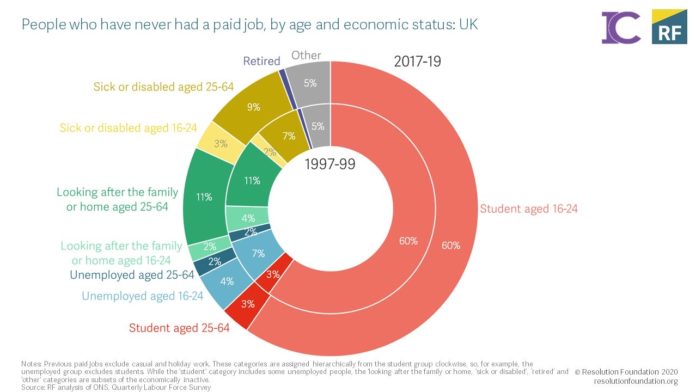There are a record number of people are in work today, but the number of people who have never worked has also increased by 50 per cent over the past two decades.
That is among the many findings of a new report out today by the think tank the Resolution Foundation
8.2 per cent of people aged 16-64 in the UK today, 3.4 million people in total) have never had a paid job, besides casual and holiday work. While lower than the 2013 high-point, this is a 52 per cent increase since 1998, when 5.4 per cent had never worked.
One commonly asserted explanation, says the report, that a generous welfare system has increasingly allowed families to choose a life of worklessness is very wide of the mark.
Household worklessness is at record lows and the generosity of out-of-work benefits has declined over recent decades.
Instead, the growth in the proportion of people who have never worked reflects changes in the lifecycle journey from education to employment, in particular a reduction in ‘earning while learning’ and slower transitions from education to employment
The employment rate of 16-17 year olds has virtually halved over the past two decades – from 48.1 per cent in 1997-99 to 25.4 per cent in 2017-19. Increased participation in education only explains a small part of this decline – two-thirds of the fall is driven by a declining employment rate among 16-17 year olds studying full time at school or college.
There has been a sharp fall in the employment rate of 18-24 year olds in further and higher education. There has been a 25 per cent fall in the employment rate of 18-19 year olds studying for degrees from the early 2000s peak, a 15 per cent fall among 20-21 year old university students, and a 33 per cent fall among 18-19 year olds studying for non-degree qualifications.
Among the recommendations of the authors are that policy makers should pay more attention to the drivers of a rising likelihood of working-age adults never having had a paid job.
Rather than cutting benefits, this means encouraging earning while learning and improving the systems that support education-to-work transitions.
Getting a first paid job after completing full-time education takes longer than it used to. In the late 1990s, 56 per cent of young education leavers who had never previously worked got a paid job within the first year after leaving.
Today that figure has fallen to 44 per cent.
Motherhood and ill-health in early adulthood effectively ‘lock in’ a lack of paid work experience for those who have not had any up to that point. The proportion of 25-39 year old mothers who have never worked has increased from 3.3 per cent in the late 1990s to 6.5 per cent today, while the proportion of 25-39 year old men with health problems who have never worked has increased from 4.8 to 7.6 per cent.







